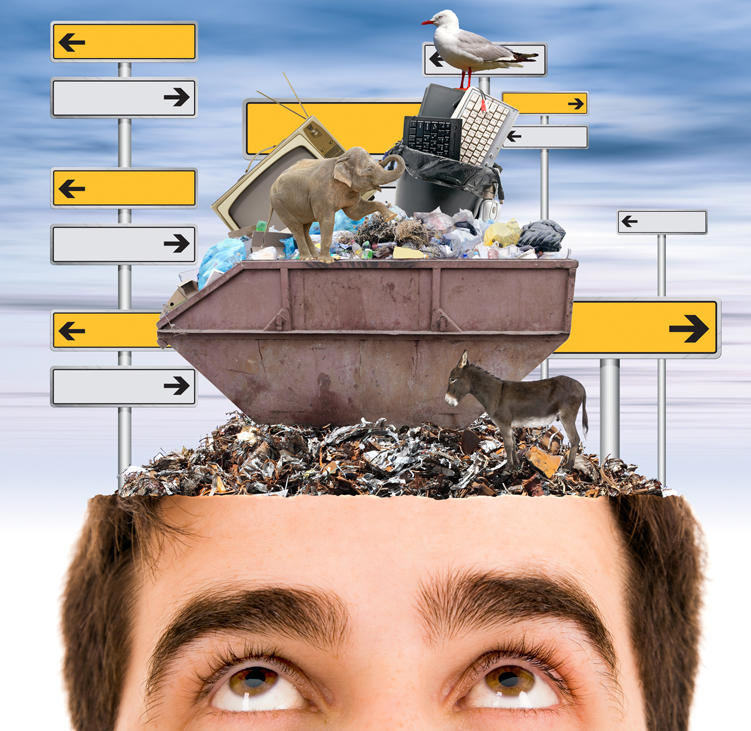There is a new kind of ignorance afoot in the world, one that results from overconsumption of information rather than from a lack of access to it.
It’s fashionable to blame cable television and the Internet for this new ignorance. And it’s true that if you spend much time watching cable news and surfing the Internet, you’ll come away thinking that many information providers are more interested in fanning fear and feeding people’s preconceived notions than they are at communicating truth.
But we should really blame ourselves for the content we’re seeing. Why? Because what shows up on the Internet and cable television is shaped by what we choose to click on and watch, and we’re making terrible choices.
Our news is largely provided by conglomerates focused on the bottom line, and they have figured out that shrill opinions and celebrity hype draw more eyes than facts and substance. To the handful of billion-dollar corporations providing much of our news, journalistic integrity equals market inefficiency. Fear, opinion and gossip are less expensive to manufacture and draw bigger audiences than the truth.
Seeking, processing and communicating information is something humans are hard-wired to do, and that has been no less an evolutionary advantage than opposable thumbs. Forming communities and sharing intelligence in a network have been key to human survival and evolution over eons. But our brains didn’t evolve the way they did in order to process bland facts and false conspiracies.
It’s a lot like our food diets. They too have changed in the last half-century, and for much the same reason. We are hard-wired to crave salt, sugar and fat, all of which were hard to come by in earlier eras. But in this age of plenty, at least in developed nations, industrialized food suppliers have filled supermarket aisles with delicious but unhealthful concoctions aimed at satisfying those cravings. Why? Because we buy them.
In the case of information, we’re wired to seek out and retain facts that are essential to our survival. Instead, we’re loading up on false information, and that can trigger fear instincts unnecessarily.
In Washington, fear born of ignorance is often on display. Not long ago, there was the guy who stood in front of the White House with a sign reading “Keep Your Government Hands Off My Medicare,” and another in front of the recently closed Walter Reed Army Medical Center whose sign read “Enlist Here to Die for Halliburton.” Neither sentiment makes much sense, but both the protesters probably believed they were highly informed.
The problem is that these days you can feast on information as never before, and you can do it without leaving the living room couch. But consuming too much of the wrong kind of information can lead to a kind of information obesity as dangerous as that caused by too much of the wrong kinds of food.
And just as it’s not General Mills’ fault that your child is eating sugary cereal for breakfast, neither can we blame the content providers who bring us Glenn Beck, Keith Olbermann, Kim Kardashian and Lindsay Lohan. They are giving us those things because we consume them.
There is a way to fix this. It starts with each of us building a healthy information diet for ourselves. We eat a lot of junk food because it is cheap and tastes good and we haven’t trained our taste buds differently. Well, your information diet is as important to your general well-being as your food diet. Building a healthy information diet can give you more time, strengthen your social relationships and reduce your stress levels.
When you are on the computer, remember that clicks have consequences — for yourself and for the rest of us. Each time you click on a salacious headline on the Huffington Post, you are not only consuming junk information you don’t need (how much more do you really need to read about J-Lo?); you’re also all but ensuring that the Huffington Post will continue to push that kind of story. Every search you make on Google is analyzed by news editors looking to see which topics are “trending” as they choose what stories to assign and put on their websites.
Your habits have immense power. A movement led by a few dozen activists and a few high-end consumers led Wal-Mart to significantly reduce the salt, fat and sugar content in the foods it sells. You can do the same thing for the media. Let’s make the market chase us. Consume deliberately, consume locally, consume close to the original source, consume less and produce more. Seek facts, not comfort. And not all the time. We’ll all be better off.
Clay Johnson is author of “The Information Diet: A Case for Conscious Consumption.” He wrote this for the Los Angeles Times.
Send questions/comments to the editors.



Success. Please wait for the page to reload. If the page does not reload within 5 seconds, please refresh the page.
Enter your email and password to access comments.
Hi, to comment on stories you must . This profile is in addition to your subscription and website login.
Already have a commenting profile? .
Invalid username/password.
Please check your email to confirm and complete your registration.
Only subscribers are eligible to post comments. Please subscribe or login first for digital access. Here’s why.
Use the form below to reset your password. When you've submitted your account email, we will send an email with a reset code.